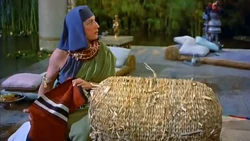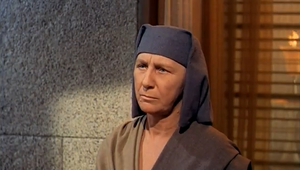| “ | Your tongue will dig your grave, Memnet. | ” |
—Bithiah to Memnet | ||
|
Memnet
| |
|
Birth
|
|
|
Death
|
|
|
Ethnicity
|
Egyptian
|
|
Religion
|
Egyptian deities
|
|
Occupation
|
palace servant
nurse |
Memnet (59 BBM – 30 ABM) was an Egyptian slave-nurse who served Bithiah and Nefretiri, during the reigns of Pharaohs Rameses I and Sethi I respectively. Being a third-generation servant, she remained allegiant to the royal Egyptian family and disapproved of Moses' entrance into the court of Pharaoh.
Biography[]
Early life[]
Memnet was born around the 59th year before Moses' birth. Her birthplace is unknown, but she was probably born in the city of Thebes. Her mother and grandmother were branded into the Pharaoh's service, and later she too became a servant to the royal family under the reigns of Rameses I and his son Sethi I.
Adoption of Moses[]

During the time when Rameses I issued the edict to kill all the Hebrew man-children, Yochabel, a Hebrew slavewoman, set her child adrift on a basket into the Nile River to save him from such edict. The child was later found among the bulrushes by Bithiah, the widowed daughter of Rameses I, who was bathing in the Nile with her maidens and was escorted by Memnet. Upon opening the basket and seeing the child's patterned-cloth, Memnet warned Bithiah that the child was a Hebrew and therefore had been set afloat on the water to save its life from her father's edict. Bithiah overlooked the matter and decided to adopt the child, against Memnet's wishes. She forced Memnet into making an oath that forbade her to reveal the baby's real parentage, and threatened her that she will die if she ever breaks it. Bithiah then named the boy "Moses" because she drew him from the water, and predicted his future success as a prince of Egypt.
Afterwards, Memnet was led by the child's real sister Miriam to Yochabel, so that Moses could be suckled by his true mother.
Return of Moses from Ethiopia[]
When Moses grew up, he indeed became a successful and accomplished Prince of Egypt. During the reign of Sethi I, he conquered Ethiopia and brought back its monarch to Thebes. When the throne princess Nefretiri was searching through her balcony to see Moses approaching the city gates, she asked Memnet if she could hear the shouts of the Thebans which, she claimed, were drowned by the beating of her heart. Memnet responded, "I hear them, Nefretiri".
Death[]

Memnet revealing to Nefretiri, the Hebrew cloth that Moses wore when an infant.
On the 30th year after Moses' birth, Memnet had broken the oath she made to Bithiah and confessed the truth–about Moses' real origin–to Nefretiri.
Personality and traits[]
| “ | Well... what croakings of doom have you today? | ” |
—Nefretiri to Memnet | ||
Memnet was notorious for being outspoken, even unto royalty. She highly favored the Nineteenth Dynasty of Egypt, and was a strict supporter of Rameses II as the successor of Pharaoh Sethi I.
Behind the scenes[]
During pre-production of The Ten Commandments, Cecil B. DeMille had originally considered Flora Robson for the role of Memnet. Although he eventually replaced her with Judith Anderson, whose appearance in the film Rebecca, had won him over.
When Bithiah drew Moses out of the water, she forced Memnet to swear that "what remains buried in the Nile [Moses' basket and real heritage] shall remain buried in your heart". However, Memnet kept Moses' piece of Hebrew cloth tucked under the upper part of her robe. She remained silent for thirty years until she heard Nefretiri referencing her marriage to Moses, and uncovered the truth and the piece of Hebrew cloth. Nefretiri, for her love of Moses, threw Memnet off the palace balcony so that the truth wouldn't reach the ears of Sethi and Rameses II and so Moses could become pharaoh. Unexpectedly, Moses arrives at the precise moment at finds out about the truth and enquires Bithiah and later travels to Goshen to meet Yochabel.
Appearances[]
- The Ten Commandments (1956)
Sources[]
- The Ten Commandments (1956)
